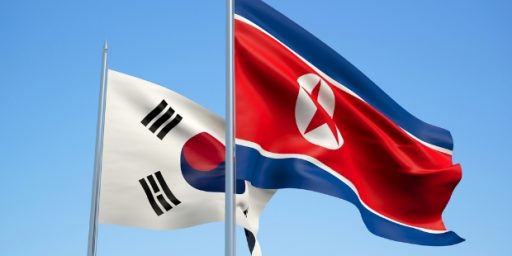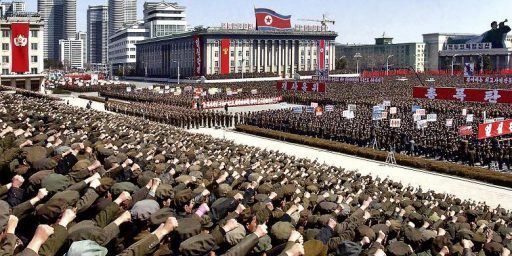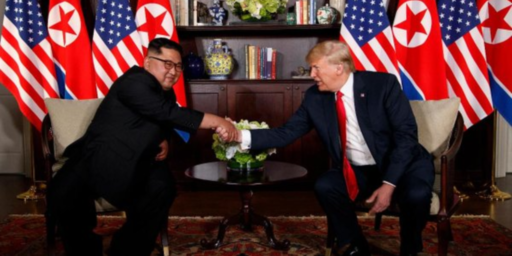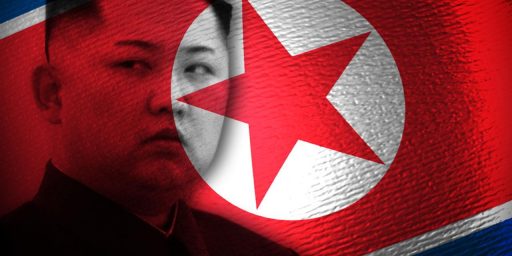Korean Culture Sweeps Asia
In a fascinating article, the New York Times provides an overview of South Korea’s initiative to export its culture:
Roll Over, Godzilla: Korea Rules (RSS)
South Korea, historically more worried about fending off cultural domination by China and Japan than spreading its own culture abroad, is emerging as the pop culture leader of Asia. From well-packaged television dramas to slick movies, from pop music to online games, South Korean companies and stars are increasingly defining what the disparate people in East Asia watch, listen to and play.
The size of South Korea’s entertainment industry, which began attracting heavy government investment only in the late 1990’s, jumped from $8.5 billion in 1999 to $43.5 billion in 2003. In 2003, South Korea exported $650 million in cultural products; the amount was so insignificant before 1998 that the government could not provide figures.
But the figures tell only part of the story. The booming South Korean presence on television and in the movies has spurred Asians to buy up South Korean goods and to travel to South Korea, traditionally not a popular tourist destination. The images that Asians traditionally have associated with the country – violent student marches, the demilitarized zone, division – have given way to trendy entertainers and cutting-edge technology.
It’s fascinating because the initiative emerged at a time when Koreans feared losses from open borders:
South Korea’s entertainment industry was born for business and political reasons in the late 1990’s. Increasingly rich Asians were thought to be receptive to new sources of entertainment. What is more, South Korea, which long banned cultural imports from Japan, its former colonial ruler, was preparing to lift restrictions starting in 1998.
Seoul was worried about the onslaught of Japanese music, videos and dramas, already popular on the black market. So in 1998 the Culture Ministry, armed with a substantial budget increase, carried out its first five-year plan to build up the domestic industry. The ministry encouraged colleges to open culture industry departments, providing equipment and scholarships. The number of such departments has risen from almost zero to more than 300.
In 2002, the ministry opened the Korea Culture and Content Agency to encourage exports. By the time almost all restrictions on Japanese culture were lifted in January 2004, the Korean Wave – a term coined in China – had washed across Asia.
While the Koreans may have initially regarded their policies as defensive moves, it’s inevitable that, after achieving some success, they would ultimately be perceived as offensive moves:
But the worry of a possible backlash – Taiwan, for instance, is considering levying a 20 percent tariff on Korean programs – impelled the Culture Ministry two years ago to form the cultural exchange foundation, to prevent Southeast Asian countries from feeling that they are regarded only as markets.
“We’ve never had this experience of seeing our culture spread outside our country,” Mr. Kim said about Korea’s modern history. “I’m very proud, but also very cautious.”
Even when applied within the context of lowering trade restrictions, subsidies naturally prompt some countries to raise border barriers. Protectionism of one kind breeds protectionism of other kinds.
Relatedly, note the diplomatic implications of the Korean Wave:
South Korea has also begun wielding the non-economic side of its new soft power. The official Korean Overseas Information Service last year gave “Winter Sonata” to Egyptian television, paying for the Arabic subtitles. The goal was to generate positive feelings in the Arab world toward the 3,200 South Korean soldiers stationed in northern Iraq.
In this light, I wonder: to what extent will Japan’s clash with China allow the Koreans to expand their market dominance?






China has been very enthusiastic in its acceptance of Korean TV, film, and music imports. And Chinese culture has been enthusiastically accepted by Koreans. Korean TV serials are a staple of Chinese TV in the Mainland, Hong Kong, and Taiwan.